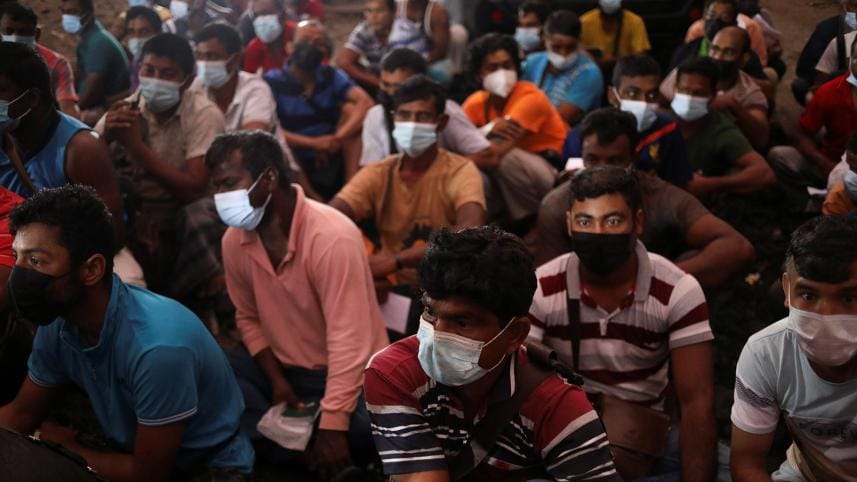Bangladeshi migrants in Malaysia: Dhaka’s uphill battle to break syndicate chains

Starting tomorrow, Bangladesh and Malaysia will hold a series of meetings, as the former faces an uphill task of reforming the labour recruitment system long plagued by syndication and corruption.
Expatriates' Welfare Adviser Asif Nazrul will meet Malaysian Human Resources Minister Steven Sim and Malaysian Home Minister Saifuddin Nasution Ismail in Putrajaya tomorrow, according to official documents.
Afterwards, the third official-level joint working group meeting will take place in Dhaka on May 21-22, followed by a meeting between Bangladesh Chief Adviser Prof Muhammad Yunus and Malaysian Prime Minister Anwar Ibrahim in mid-July.
Following the formation of the interim government, Anwar Ibrahim was the first head of a foreign government to visit Bangladesh and meet the chief adviser last October.
The prominent topic of discussions was cooperation on labour recruitment and welfare, alongside other agendas including trade, investment and regional cooperation.
Now, as Malaysia prepares to begin fresh labour recruitments, opening the market to Bangladeshis and ensuring migrants' rights will figure high in the upcoming meetings.
Speaking to The Daily Star yesterday, Sarwoer Alam, deputy secretary of the expatriates' welfare ministry, said, "Our focus will be on the reopening of the labour market and regularisation of the undocumented Bangladeshis in Malaysia."
He added that the government will try to open the labour market to all capable recruiting agencies.
According to Malaysian official data, 898,970 Bangladeshis are currently working in Malaysia -- the highest number among foreign nationalities after Indonesians and Nepalis. Migrant rights activists in Malaysia say the actual number would be higher if undocumented migrants were counted.
The rights activists reported numerous issues affecting the labour recruitment sector, with many migrants left jobless, unpaid, underpaid, defrauded or trapped in debt.
LABOUR ISSUES PERSIST UNCHECKED
Labour recruitment from Bangladesh to Malaysia has been halted multiple times since formal recruitment began in the 1990s, largely due to powerful lobbies in both countries. The latest instance was in 2022, when Malaysia selected only 101 Bangladeshi agencies to conduct recruitment without clarifying the criteria for selection.
Before halting recruitment in May 2024, Malaysia had recruited nearly 500,000 Bangladeshis. Each of these workers reportedly spent between $4,500 and $6,000 for a job there. Many employers were allegedly fraudulent but managed to secure approval to recruit foreign workers by bribing officials in both countries.
Nepal-based migrant rights activist Andy Hall, who closely follows Malaysia's labour issues, estimated that around 1-2 lakh Bangladeshi workers in Malaysia were jobless last year.
"By now, some of them might have managed jobs, but there are others who have become jobless," he told this newspaper.
"We've seen many workers unpaid or underpaid. They report to the labour department, but hardly get redress … New recruitment, as being discussed, can definitely happen but what about the ones already jobless and in trouble?" Hall questioned.
An independent migration researcher based in Kuala Lumpur said it is unimaginable how so many Bangladeshis in Malaysia are surviving without jobs or pay, after spending large sums to migrate.
Many workers become undocumented because their employers fail to renew their visas. Others fall into this category because they cannot get their passports renewed on time by the Bangladesh high commission, he said.
"These workers remain indebted and worried for their families. This is a serious level of migrant exploitation," he told The Daily Star, requesting anonymity for fear of being targeted by agents and authorities.
Meanwhile, the same syndicate of 101 recruiting agencies in Bangladesh is lobbying the interim government to reopen the Malaysian market.
Mohammed Fakhrul Islam, joint secretary general-1 of the Bangladesh Association of International Recruiting Agencies (BAIRA), said, "I am not against the reopening of the market, but the question is how will it be reopened, what will be the recruitment system -- syndicated or open for all agencies?"
He said corrupt leaders and officials were involved in the syndicate earlier, adding, "Will the interim government that was established to check inequality follow the same path? It will be extremely unfortunate if it does."
Fakhrul, who regularly campaigns against the syndicate, said Chief Adviser Prof Yunus, who has a good rapport with Malaysian leader Anwar Ibrahim, must work to dismantle the syndicate and help reduce recruitment costs.
Andy Hall said Nepal has always strongly opposed syndicates in Malaysia's labour recruitment, allowing it to secure a far better deal than Bangladesh.
"I would urge Bangladesh to take a strong position against the syndicate if it wants to improve the lives of the migrants in Malaysia."
He also said Malaysia must address the issue of jobless migrants before beginning new recruitment. "Those who are unemployed can be recruited into the companies that want new workers," he suggested.
18,000 WORKERS LIE IN WAIT
During Anwar Ibrahim's visit last October, a key request made by Bangladesh was for the recruitment of nearly 18,000 Bangladeshis who had already paid Tk 4–5 lakh and obtained visas.
These workers were scheduled to fly to Malaysia by May 31, 2024. However, a ticket shortage -- caused by a surge in demand before the deadline -- prevented many from travelling.
Some others, despite having tickets, were unable to go as the Malaysian government blacklisted the companies that hired them.
The workers filed complaints with the government and staged several protests, prompting the Bangladesh High Commission in Malaysia to raise the issue with Malaysian authorities.
A joint technical group, comprising representatives from Malaysia's immigration department and the Bangladesh High Commission, was formed and initially created a list of around 8,000 workers for recruitment. However, the workers have yet to travel.
"This is a priority issue for Bangladesh to discuss and take forward," a foreign ministry official said.
Regarding the renewed engagement with Malaysia, BAIRA Secretary General Ali Haider Chowdhury said, "It is essential to prioritise the regulations of both governments, safeguard the interests of workers and ensure low-cost migration."





 For all latest news, follow The Daily Star's Google News channel.
For all latest news, follow The Daily Star's Google News channel.
Comments